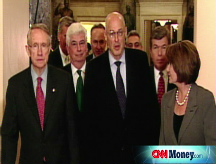No love for the bailout
Stocks around the globe plunged on news of the bailout bill. Treasurys rose and the dollar rallied - but for all the wrong reasons.

 |
| ...and the doillar has bounced back against the euro, a possible sign that as bad as the U.S. banking crisis is, investors see the U.S. as more stable than Europe. |
NEW YORK (CNNMoney.com) -- What do investors think about the $700 billion package? Depends whom you ask.
Stock markets gave it the thumbs down in the morning when it looked like it would sail through Congress but they also didn't like the fact that the bill was rejected in the House Monday either.
The Dow was down more than 300 points in late morning trading Monday but fell more than 700 points in late-afternoon trading after the House failed to pass the bailout bill.
Asian markets finished sharply lower Monday and in midday trading, most European stock markets were down as well.
A bailout, should it eventually pass, could help get struggling financial firms back on their feet but investors realize that the recovery will be a long process and that more bank bombshells could lie in waiting.
"It's akin to the end of the cold war," said Matthew Lloyd, chief investment strategist of Advisors Asset Management, an institutional investment firm based in Monument, Colo. "You woke up the next day after the signing of the anti-proliferation of nuclear arms treaty and you felt better. But you still didn't forget how to duck for cover."
After all, Wachovia (WB, Fortune 500) was forced to sell off its banking assets to Citigroup (C, Fortune 500) Monday morning to avoid a complete collapse.
And last week, Washington Mutual (WM, Fortune 500) was seized by regulators in the largest bank failure in history. WaMu was then sold at a bargain basement price to JPMorgan Chase (JPM, Fortune 500).
"People are very seriously concerned that there's no panacea from legislative action," said Daniel Alpert, managing director of Westwood Capital, a New York-based investment bank.
"Fundamentally, none of the problems gets solved by the bailout. This may solve the freeze-up of the capital market but it doesn't address the decline in housing prices," Alpert said, adding that he expects to see more consolidation in the banking sector since there probably are many more mortgage-related writedowns still to come.
Interestingly, the dollar rallied a bit against the euro as well as the British pound. It slipped against the yen though.
Bonds also rose, pushing the yield on the benchmark 10-Year Treasury down to 3.63%, from 3.83% on Friday. Bond prices and yields move in opposite directions.
Lloyd said this is a sign that, despite its problems, America still looks like a safer place to invest than say, Europe.
"Treasurys are a safe haven right now," Lloyd said. "And the main thing with currencies is you don't have to be bullish on one and bearish on the other. People are just less bearish on the dollar versus other currencies, especially the euro, right now."
European banks and financial firms are also starting to crumble under the weight of credit crunch pressures.
On Monday morning, Dutch-Belgian banking giant Fortis NV was partially nationalized. The governments of Belgium, the Netherlands and Luxembourg chipped in $16.4 billion to rescue Fortis.
The British government said Monday it is nationalizing beleaguered mortgage lender Bradford & Bingley
In addition, Iceland took control of that country's third-largest bank, while the government of Germany provided a 35 billion euro ($51.2 billion) to Hypo Real Estate Holding AG, Germany's second-largest commercial property lender.
"Currencies price on the relative quality of economies," Alpert said, "It's very clear that Europe had the wits scared out of it overnight. There is now a mindset that Europe has serious problems."
So unfortunately, the boost in the dollar and Treasurys may not be a sign that the worst is over for the U.S. financial system just yet. Alpert said that the move into the dollar and bonds Monday isn't as much a flight to quality as it is a "flight to refuge." ![]()




